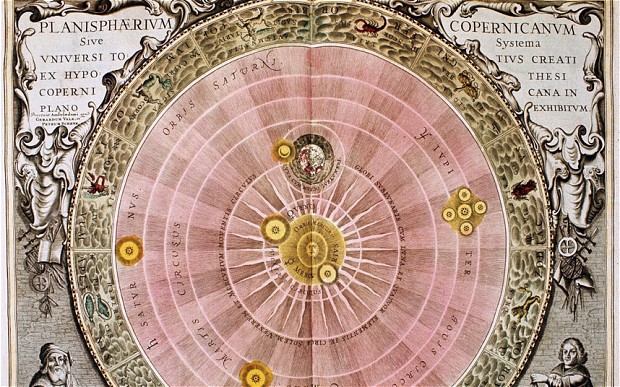On the run-up to William Shakespeare’s 450th birth anniversary on April 2014, the extraordinary interest expressed in his plays about science and the scientific discoveries of his time is stoking speculation that the Bard also dabbled in science fiction. Is it then possible that Shakespeare preceded Mary Shelley of
Frankenstein fame by 200 years in writing sci-fi?
This intriguing prospect was raised in “William Shakespeare, the ‘king of infinite space’”, an article by science journalist Dan Falk that came out in the January 27, 2014 issue of
The Telegraph UK. Falk is the author of the book
The Science of Shakespeare that’s scheduled for publication in April.
 FROM THE TELEGRAPH UK
FROM THE TELEGRAPH UKFalk argues that Shakespeare had a great interest in astronomy—his plays being replete with references to the Sun, Moon, stars, comets, eclipses, and heavenly spheres—at a time when the Copernican theory was attracting early adherents in Britain. Copernicus had just shown that contrary to long-held religious dogma, it was the Sun and not Earth that was at the center of the Universe, with Earth and the other planets rotating around it in circular paths (
“Copernicus’ heliocentric theory as the mother of all paradigm shifts”). Falk therefore believes it’s likely that when Hamlet envisions himself in the play as “a king of infinite space,” Shakespeare was alluding to the new, infinite universe that was the logical consequence of Copernicus’ idea.
Falk cites several other instances where Shakespeare’s demonstrated a surprising alertness and interest in the scientific naturalism of his time, as in the play
Julius Caesar, when Cassius makes this memorable declaration: “The fault, dear Brutus, is not in our stars, but in ourselves, that we are underlings.”
To these speculations, though, Falk makes this caveat: “As with the Bible, one can find anything in Shakespeare if one looks hard enough. He was not a scientist, but perhaps he was more conscious of changing conceptions of our world than we imagine.”
Read Dan Falk’s “William Shakespeare, the ‘king of infinite space’” in The Telegraph now!ANOTHER INTERESTING READING:In a review of Gregory Berns’s book
How Dogs Love Us (New Harvest, 272 pages) in the January 23, 2014 issue of the
Boston Review, Colin Dayan argues that for the author to claim that dogs have the reasoning capacity of a young child is to continue to ignore what it is that dogs possess that we do not. “Dogs are not people,” Dayan says. “Dogs are not humans. But we are desperate to appropriate whatever it means to be dog and to make that over in our image.”
Read Colin Dayan’s “Dogs are Not people” in the BostonReview.net now!RELATED READING EARLIER IN THE FORUM:Looking objectively at a famous dog’s life-saving heroism